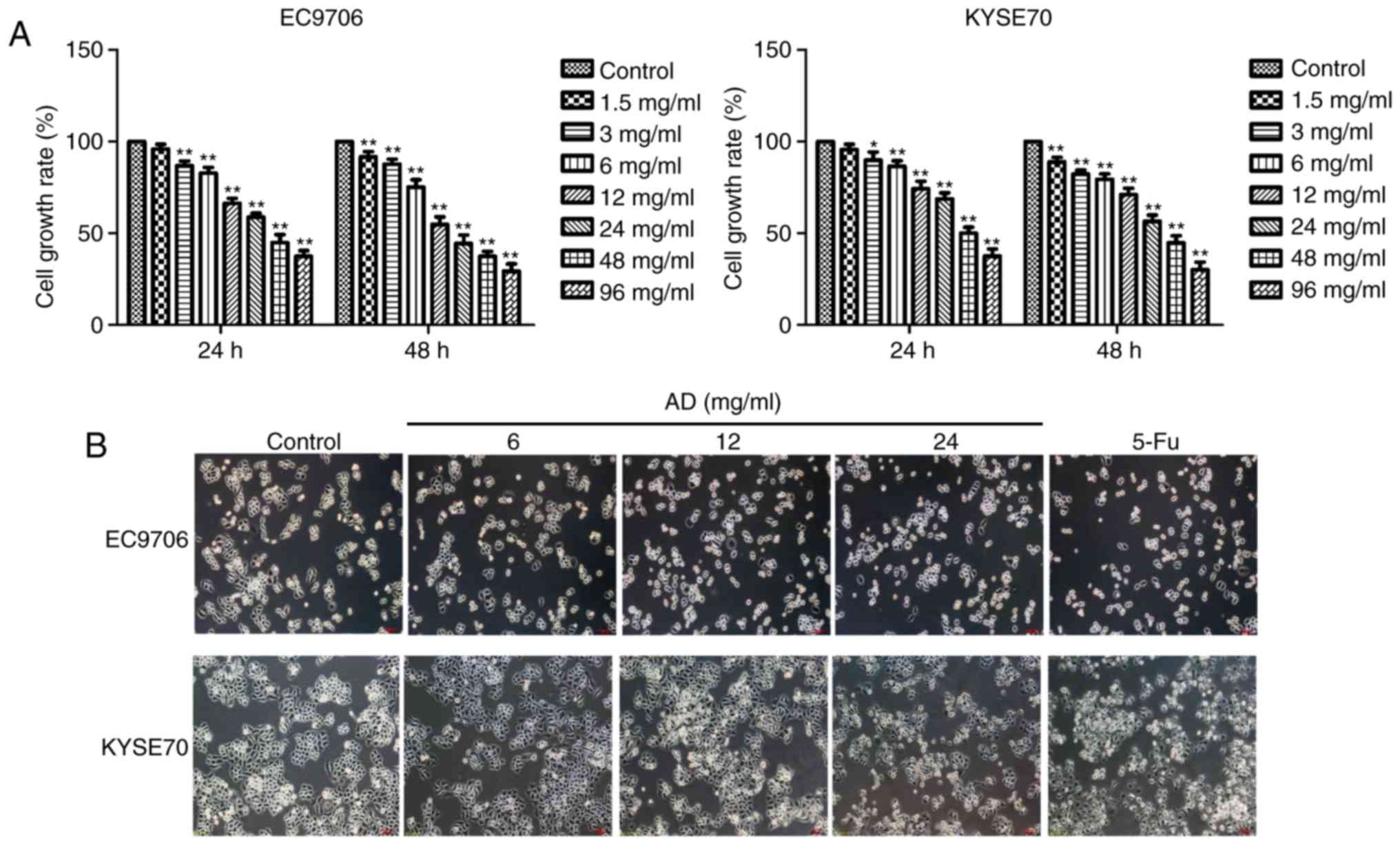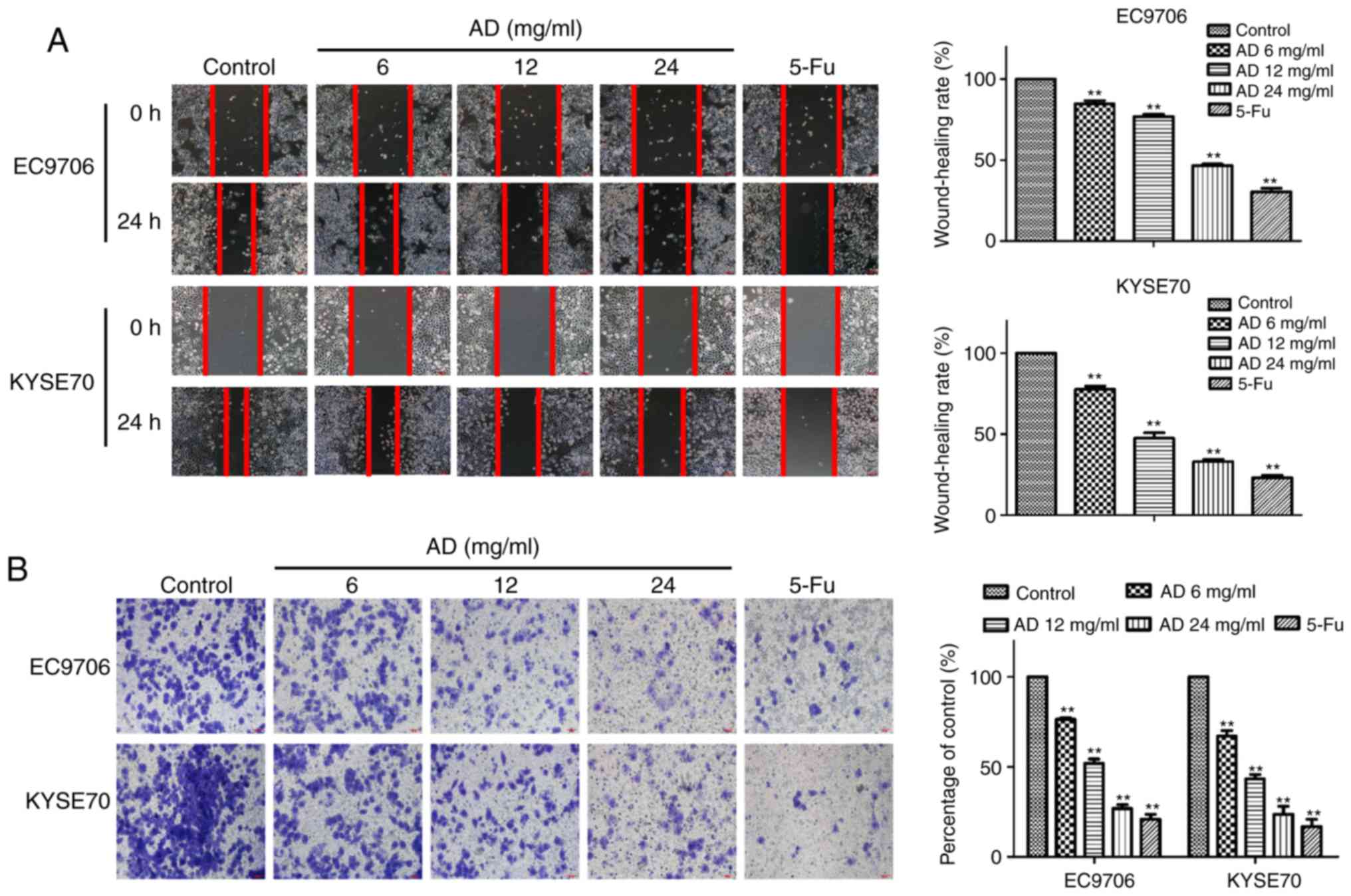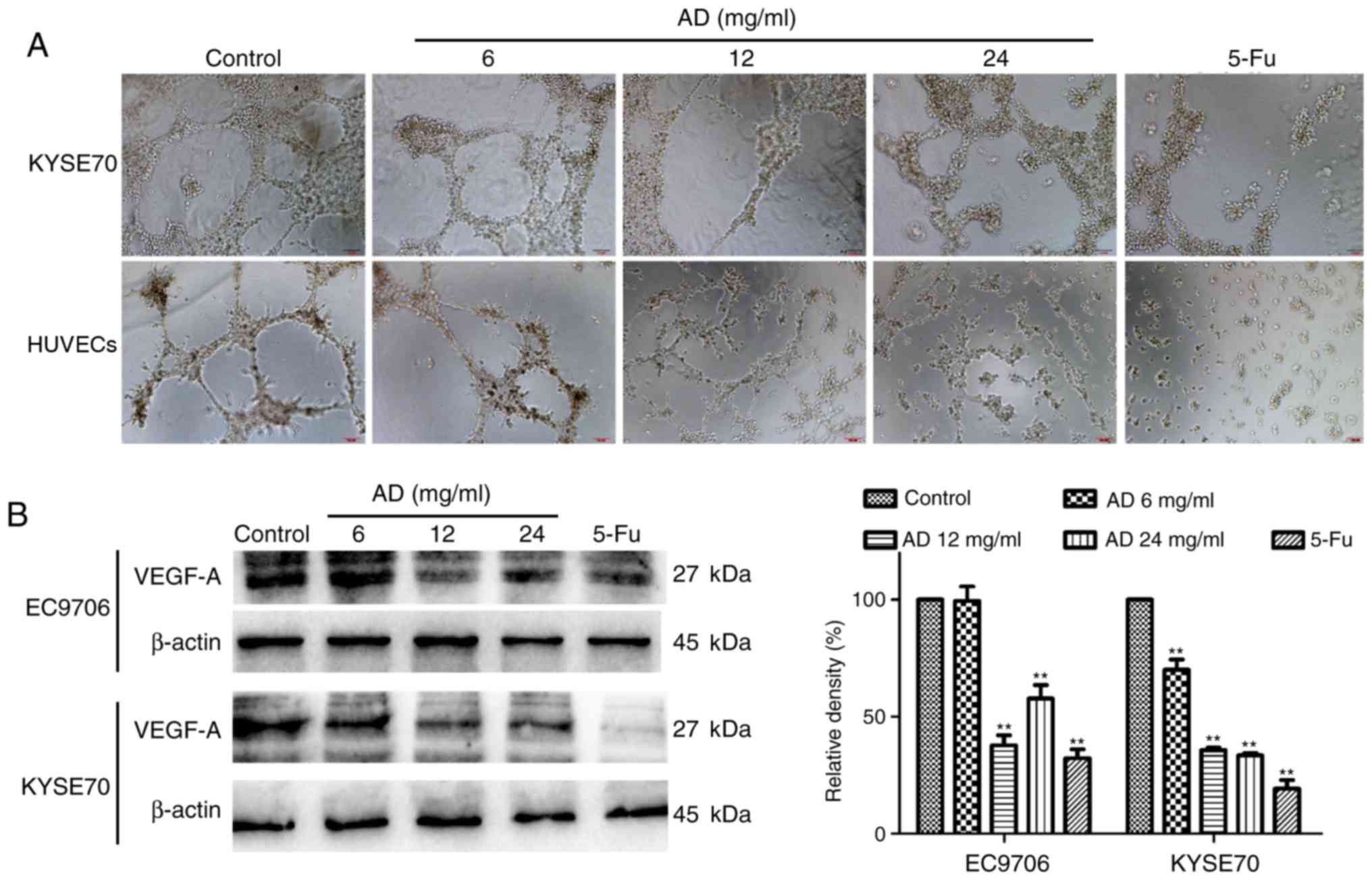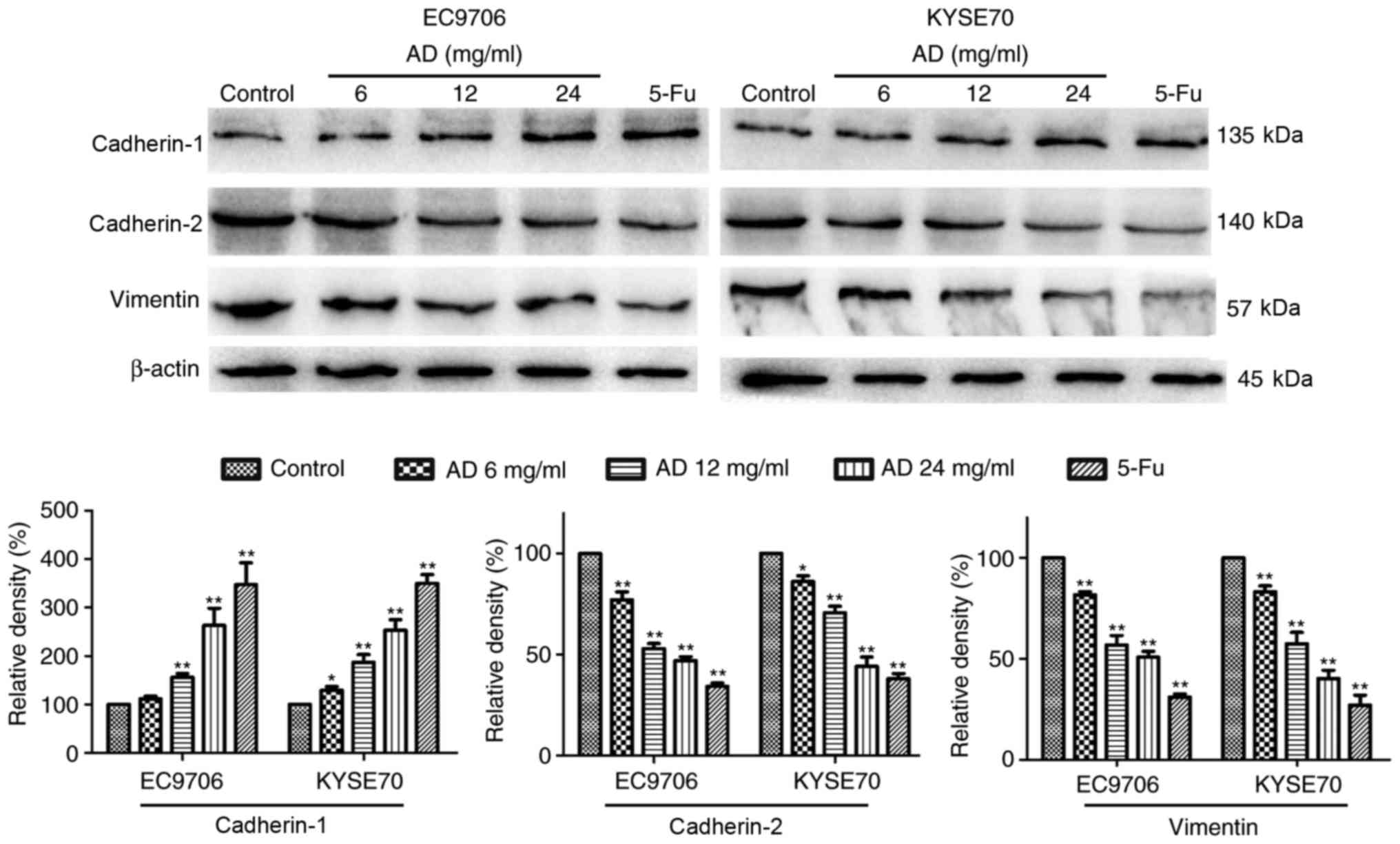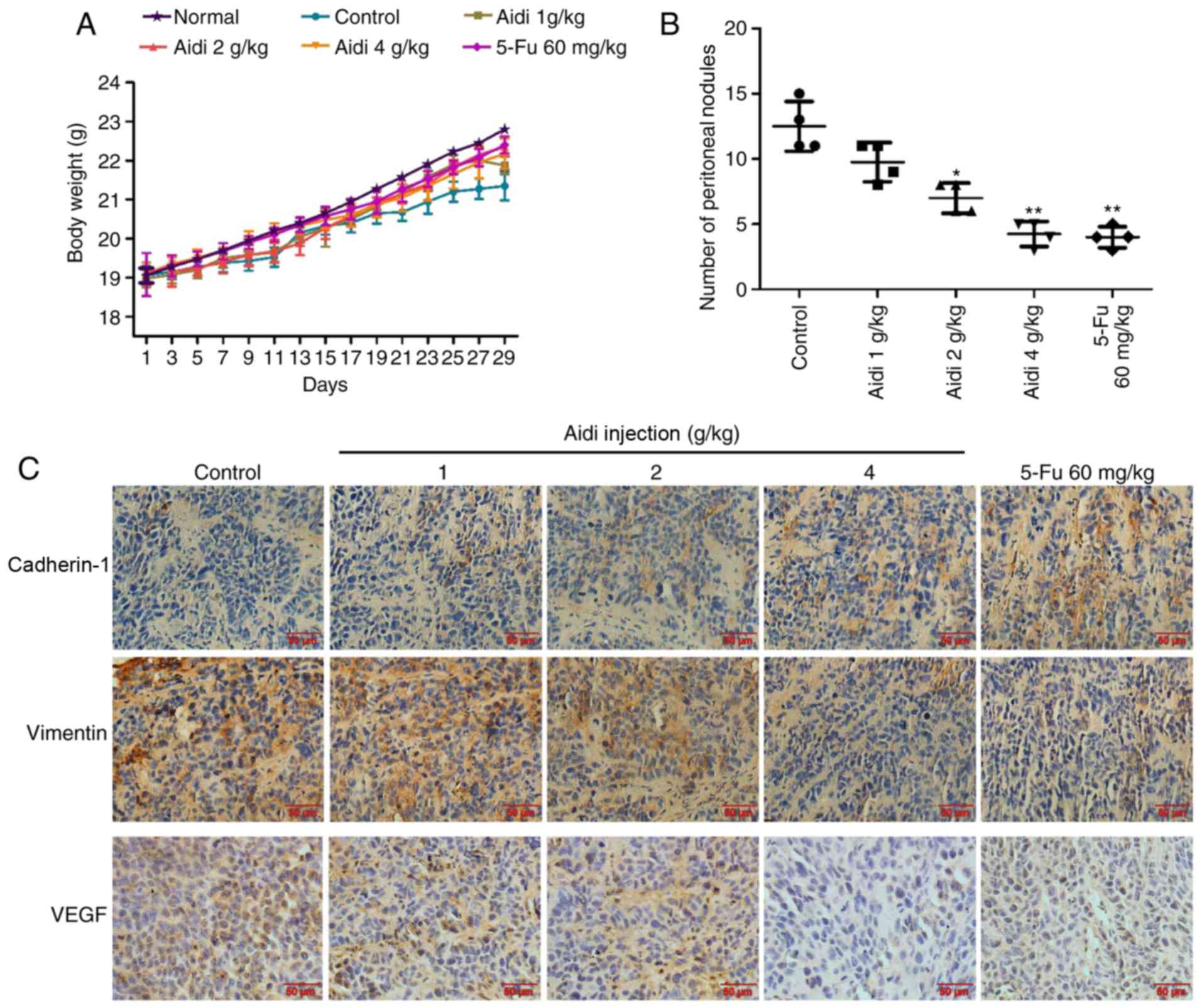|
1
|
Chen W, Zheng R, Baade PD, Zhang S, Zeng
H, Bray F, Jemal A, Yu XQ and He J: Cancer statistics in China,
2015. CA Cancer J Clin. 66:115–132. 2016. View Article : Google Scholar : PubMed/NCBI
|
|
2
|
Li S, Qin X, Chai S, Qu C, Wang X and
Zhang H: Modulation of E-cadherin expression promotes migration
ability of esophageal cancer cells. Sci Rep. 6:217132016.
View Article : Google Scholar : PubMed/NCBI
|
|
3
|
Zhang L, Ma J, Han Y, Liu J, Zhou W, Hong
L and Fan D: Targeted therapy in esophageal cancer. Expert Rev
Gastroenterol Hepatol. 10:595–604. 2016. View Article : Google Scholar : PubMed/NCBI
|
|
4
|
Arnal Domper MJ, Ferrández Arenas Á and
Arbeloa Lanas Á: Esophageal cancer: Risk factors, screening and
endoscopic treatment in Western and Eastern countries. World J
Gastroenterol. 21:7933–7943. 2015. View Article : Google Scholar : PubMed/NCBI
|
|
5
|
Zeng H, Zheng R, Zhang S, Zuo T, Xia C,
Zou X and Chen W: Esophageal cancer statistics in China, 2011:
Estimates based on 177 cancer registries. Thorac Cancer. 7:232–237.
2016. View Article : Google Scholar : PubMed/NCBI
|
|
6
|
Jain R, Gupta S, Pasricha N, Faujdar M,
Sharma M and Mishra P: ESCC with metastasis in the young age of
caustic ingestion of shortest duration. J Gastrointest Cancer.
41:93–95. 2010. View Article : Google Scholar : PubMed/NCBI
|
|
7
|
Ludmir EB, Robey B, Shelby E, Patel-Nguyen
SV, Rittershaus A and Contarino MR: Skeletal muscle metastasis from
signet ring cell esophageal adenocarcinoma. Transl Gastroenterol
Hepatol. 1:372016. View Article : Google Scholar : PubMed/NCBI
|
|
8
|
Wang H, Deng F, Liu Q and Ma Y: Prognostic
significance of lymph node metastasis in esophageal squamous cell
carcinoma. Pathol Res Pract. 213:842–847. 2017. View Article : Google Scholar : PubMed/NCBI
|
|
9
|
Xiao Z, Wang C, Zhou R, Hu S, Yi N, Feng
J, Zhou M, Liu S, Chen L, Ding J, et al: Can Aidi injection improve
overall survival in patients with non-small cell lung cancer? A
systematic review and meta-analysis of 25 randomized controlled
trials. Complement Ther Med. 37:50–60. 2018. View Article : Google Scholar : PubMed/NCBI
|
|
10
|
Xu J, Ju WZ and Tan HS: Study of
pharmacological effects and clinical application of Aidi injection.
Pharm Clin Res. 1:48–51. 2012.(In Chinese).
|
|
11
|
Zhang H, Jiang H, Hu X and Jia Z: Aidi
injection combined with radiation in the treatment of non-small
cell lung cancer: A meta-analysis evaluation the efficacy and side
effects. Cancer Res Ther. 11 Suppl 1:C118–C121. 2015. View Article : Google Scholar
|
|
12
|
Lou HZ, Pan HM and Jin W: Clinical study
on treatment of primary liver cancer by Aidi injection combined
with cool-tip radiofrequency ablation. Zhongguo Zhong Xi Yi Jie He
Za Zhi. 27:393–395. 2007.(In Chinese). PubMed/NCBI
|
|
13
|
Ji B and Yuan J: Meta-analysis of the
clinical efficacy and safety about Aidi injection in the treatment
of colorectal cancer. China Pharm. 40:3797–3799. 2011.(In
Chinese).
|
|
14
|
Zhang MM, Liu YL, Chen Z, Li XR, Xu QM and
Yang SL: Studies on chemical constituents from Aidi injection. Chin
Tradit Herbal Drugs. 8:1462–1470. 2012.(In Chinese).
|
|
15
|
Jiancheng W, Long G, Ye Z, Jinlong L, Pan
Z, Lei M and Kehu Y: Effect of aidi injection plus chemotherapy on
gastric carcinoma: A meta-analysis of randomized controlled trials.
J Tradit Chin Med. 35:361–74. 2015. View Article : Google Scholar : PubMed/NCBI
|
|
16
|
Wang Q, He X, Tian J, Wang X, Ru P, Ruan Z
and Yang K: A meta-analysis of aidi injection plus taxotere and
cisplatin in the treatment of non-small cell lung cancer. Zhongguo
Fei Ai Za Zhi. 13:1027–1034. 2010.(In Chinese). PubMed/NCBI
|
|
17
|
Jin X, Zhu Z and Shi Y: Metastasis
mechanism and gene/protein expression in gastric cancer with
distant organs metastasis. Bull Cancer. 101:E1–E12. 2014.PubMed/NCBI
|
|
18
|
Jones-Bolin S: Guidelines for the care and
use of laboratory animals in biomedical research. Curr Protoc
Pharmacol Appendix 4: Appendix 4B. 2012.doi:
10.1002/0471141755.pha04bs59. View Article : Google Scholar
|
|
19
|
Robert J: Biology of cancer metastasis.
Bull Cancer. 100:333–342. 2013.(In French). PubMed/NCBI
|
|
20
|
Tao W, Luo X, Cui B, Liang D, Wang C, Duan
Y, Li X, Zhou S, Zhao M, Li Y, et al: Practice of traditional
Chinese medicine for psycho-behavioral intervention improves
quality of life in cancer patients: A systematic review and
meta-analysis. Oncotarget. 6:39725–39739. 2015. View Article : Google Scholar : PubMed/NCBI
|
|
21
|
Xiao Z, Liang R, Wang CQ, Xu S, Li N, He
Y, Tang F, Chen L and Ma H: Can aidi injection alleviate the
toxicity and improve the clinical efficacy of radiotherapy in lung
cancer? A meta-analysis of 16 randomized controlled trials
following the PRISMA guidelines. Medicine (Baltimore).
95:e45172016. View Article : Google Scholar : PubMed/NCBI
|
|
22
|
Wang L, Huang XE and Cao J: Clinical study
on safety of cantharidin sodium and shenmai injection combined with
chemotherapy in treating patients with breast cancer
postoperatively. Asian Pac J Cancer Prev. 15:5597–600. 2014.
View Article : Google Scholar : PubMed/NCBI
|
|
23
|
Ji ZQ, Huang XE, Wu XY, Liu J, Wang L and
Tang JH: Safety of Brucea javanica and cantharidin combined with
chemotherapy for treatment of NSCLC patients. Asian Pac J Cancer
Prev. 15:8603–8605. 2014. View Article : Google Scholar : PubMed/NCBI
|
|
24
|
Liu Y, Zhang W, Wang XJ and Liu S:
Antitumor effect of Kanglaite® injection in human
pancreatic cancer xenografts. BMC Complement Altern Med.
14:2282014. View Article : Google Scholar : PubMed/NCBI
|
|
25
|
Xiao Z, Wang C, Chen L, Tang X, Li L, Li
N, Li J, Gong Q, Tang F, Feng J and Li X: Has aidi injection the
attenuation and synergistic efficacy to gemcitabine and cisplatin
in non-small cell lung cancer? A meta-analysis of 36 randomized
controlled trials. Oncotarget. 8:1329–1342. 2017.PubMed/NCBI
|
|
26
|
Wang Z, Dabrosin C, Yin X, Fuster MM,
Arreola A, Rathmell WK, Generali D, Nagaraju GP, El-Rayes B,
Ribatti D, et al: Broad targeting of angiogenesis for cancer
prevention and therapy. Semin Cancer Biol. 35 Suppl:S224–S243.
2015. View Article : Google Scholar : PubMed/NCBI
|
|
27
|
Yu J, Zhang Y, Leung LH, Liu L, Yang F and
Yao X: Efficacy and safety of angiogenesis inhibitors in advanced
gastric cancer: a systematic review and meta-analysis. J Hematol
Oncol. 9:1112016. View Article : Google Scholar : PubMed/NCBI
|
|
28
|
Qiao L, Liang N, Zhang J, Xie J, Liu F, Xu
D, Yu X and Tian Y: Advanced research on vasculogenic mimicry in
cancer. J Cell Mol Med. 19:315–326. 2015. View Article : Google Scholar : PubMed/NCBI
|
|
29
|
Gianni-Barrera R, Trani M, Fontanellaz C,
Heberer M, Djonov V, Hlushchuk R and Banfi A: VEGF over-expression
in skeletal muscle induces angiogenesis by intussusception rather
than sprouting. Angiogenesis. 16:123–136. 2013. View Article : Google Scholar : PubMed/NCBI
|
|
30
|
Xu XL, Ling ZQ, Chen W, Xu YP and Mao WM:
The overexpression of VEGF in esophageal cancer is associated with
a more advanced TMN stage: A meta-analysis. Cancer Biomark.
13:105–113. 2013. View Article : Google Scholar : PubMed/NCBI
|
|
31
|
Davis FM, Stewart TA, Thompson EW and
Monteith GR: Targeting EMT in cancer: Opportunities for
pharmacological intervention. Trends Pharmacol Sci. 35:479–488.
2014. View Article : Google Scholar : PubMed/NCBI
|
|
32
|
Banyard J and Bielenberg DR: The role of
EMT and MET in cancer dissemination. Connect Tissue Res.
56:403–413. 2015. View Article : Google Scholar : PubMed/NCBI
|
|
33
|
Che N, Zhao XL, Sun T, Zhao XM, Gu Q, Dong
XY, Zhao N, Liu YR, Yao Z and Sun BC: The role of Twist1 in
hepatocellular carcinoma angiogenesis: A clinical study. Hum
Pathol. 42:840–847. 2011. View Article : Google Scholar : PubMed/NCBI
|
|
34
|
Liu Z, Sun B, Qi L, Li H, Gao J and Leng
X: Zinc finger E-box binding homeobox 1 promotes vasculogenic
mimicry in colorectal cancer through induction of
epithelial-to-mesenchymal transition. Cancer Sci. 103:813–820.
2012. View Article : Google Scholar : PubMed/NCBI
|
|
35
|
Sun T, Zhao N, Zhao XL, Gu Q, Zhang SW,
Che N, Wang XH, Du J, Liu YX and Sun BC: Expression and functional
significance of Twist1 in hepatocellular carcinoma: Its role in
vasculogenic mimicry. Hepatology. 51:545–556. 2010. View Article : Google Scholar : PubMed/NCBI
|















